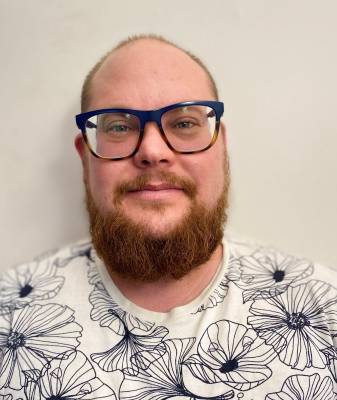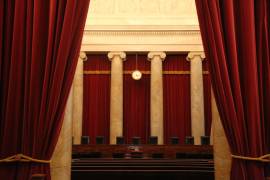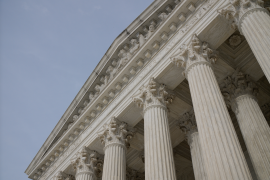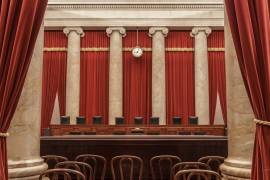
Ethan Rice Believes It’s Urgent to Restore Trust in Our Court System and That It Requires Big Changes
Blog Search
Ethan Rice
Senior Attorney, Fair Court Project
Pronouns: he/him
As a teenager, Lambda Legal Senior Attorney Ethan Rice understood the power the courts could have on this country. In 2003, the U.S. Supreme Court handed down the groundbreaking Lawrence v. Texas decision, in which they struck down all remaining sodomy laws in the country criminalizing private and consensual sex between people of the same-sex.
"While I was completely OK with myself regardless of what people said or what laws were in place, as a teenager, I had a pretty strong awareness that LGBTQ+ people were still being criminalized for our relationships and even [non-sexual intimacy] such as holding hands and kissing," the Florida native said. "This SCOTUS decision was a big deal for me and many of us."
That case, which Lambda Legal litigated, was also his first introduction to Lambda Legal's transformative and crucial work for the LGBTQ+ community and people living with HIV. After studying international law, working in Florida's child welfare system, and volunteering in the LGBTQ+ legal space, in 2016 Ethan serendipitously began working at Lambda Legal as a senior attorney for our Fair Courts Project. This initiative provides tools and information to counter harmful attacks on the courts that threaten LGBTQ+ and HIV-related civil rights. To Ethan, looking at the systematic oppression our community faces in the courts and the loss of trust people have for this country's radicalized Supreme Court, this project is more important than ever.
"Bias is everywhere, and many attorneys and judges either haven't thought about it at all and don't know what to do, or they absolutely do it intentionally. But I will keep educating them on the importance of protecting LGBTQ+ people in the courts and advocating for change,” he stressed.
For our newest installment of Meet Our Lawyers, we sat down with Ethan to discuss his legal career journey, what needs to be done to restore our faith in our federal and state courts, and why being trans brings him so much joy.
What brought you to work at Lambda Legal?
Since I was a teenager, I've looked up to Lambda Legal and have been inspired by the incredible work done here. I was 20 when Lawrence v. Texas was decided, which showed me that Lambda Legal's work was groundbreaking and necessary.
After law school, I worked in the child welfare system in Florida and found a Lambda Legal publication about LGBTQ+ youth in the child welfare system in our office. It was the only document, at that time, I had seen that addressed this population, despite their overrepresentation, particularly youth of color, in the system. It helped me see there could be a path to working on behalf of LGBTQ+ people for me.
After working as a Staff Attorney for the Transgender Legal Defense and Education Fund (TLDEF), I realized that educating attorneys and judges about LGBTQ+ people and our legal needs was a gratifying part of the work. So, when Lambda Legal had an opening in their Fair Courts Project, I jumped at the opportunity. It's been an honor working to make the court system more fair, just, and accessible for all LGBTQ+ people and people living with HIV.
Can you tell us about the Fair Courts Project and how LGBTQ+ people and people living with HIV are discriminated against daily in the justice system?
The Fair Courts Project at Lambda focuses on judicial independence, accountability, and access to justice for LGBTQ+ people and people living with HIV, including anti-discrimination efforts in the courts. Unfortunately, LGBTQ+ people still face considerable discrimination and bias in the court system. We know from our survey, Protected and Served? (an updated version soon to be released) and other reports that many LGBTQ+ people have heard negative comments about sexual orientation or gender identity by attorneys, judges, and court staff. Additionally, transgender and nonbinary people are frequently misgendered and deadnamed in the courts. There is also bias and discrimination among jurors against LGBTQ+ people, and because of this, trust of the courts among LGBTQ+ people is fairly low.
Looking at past and potentially upcoming SCOTUS rulings, why are federal courts so important to LGBTQ people? What can be done to improve trust in the courts and system?
Federal courts play a critical role in the rights of all LGBTQ+ people as most cases that address our rights are brought in the federal court system. Since SCOTUS has the final say in these cases, including the decision of whether or not to take a case, their rulings can impact a vast number of people in this country. Cases like Dobbs v. Jackson Women's Health Organization—where the Supreme Court overturned Roe v. Wade and Planned Parenthood v. Casey—also impact LGBTQ+ people because lesbian and bisexual women, transgender men, two-spirit, intersex, and nonbinary and gender nonconforming people need access to abortion services. But also because the foundation of LGBTQ+ rights was built upon these cases [such as Lawrence v. Texas].
The Supreme Court has lost the public's confidence and truly eroded its legitimacy. There are reforms that need to be made now if we want to restore that trust. Lambda Legal and other LGBTQ+ litigating organizations have called for urgent reforms to the Supreme Court, such as expanding the number of seats on the Court to 13 — the number of circuits in the federal judiciary, restoring voting rights, adopting an enforceable ethics code for the Supreme Court, and lifting the filibuster to allow the Senate to consider all of these proposals.
While federal courts hear many important cases that impact our rights, the vast majority of cases are heard in state courts. Most people will never be in a federal court but will likely be in a state court at some point. State courts hear family law cases, most criminal cases, and everything from name changes to traffic infractions. Our state courts are under attack too—we must start paying more attention to them. We can all make a tremendous impact on our local, state, and federal courts simply by paying attention to the legislation that is directed to the courts and making clear to our representatives that we care about the courts.
What has been your proudest moment at Lambda Legal?
I'm very proud of the work I've had the privilege to do toward ending discrimination in jury selection and jury trials. One of my proudest moments was when the 11th Circuit decided that judges must allow juries to be questioned about sexual orientation bias in certain situations. In 2017, we filed a friend-of-the-court brief in the case, Berthiaume v. Smith, urging the 11th Circuit to make clear that the U.S. Constitution required this type of questioning in certain cases to protect the right to a fair trial. In Berthiaume v. Smith, a federal trial judge refused to allow any questions of the potential jury about sexual orientation bias. Mr. Berthiaume, an openly gay man, sued the City of Key West Police Department and Officer Smith for excessive use of force when he was arrested for an alleged battery against his former same-sex partner (the charges were later dropped). All of Mr. Berthiaume's witnesses were gay, and there was no way to avoid issues of sexual orientation at the trial. The court said in this type of case, judges must allow questions about sexual orientation bias.
I'm also proud of my work educating attorneys and judges across the country. One of my most memorable experiences was providing training to those who work in the child welfare system in Kansas. It was a full-circle moment for me to travel across the state and have the opportunity to talk directly and openly about LGBTQ+ youth in the child welfare system in a way that hadn't happened when I was working in the field in Florida. I have also created a training curriculum to help others talk about LGBTQ+ topics with attorneys and judges called Moving Beyond Bias: How to Ensure Access to Justice for LGBT People.
Tell us something personal about yourself: What brings you joy? And why?
Being trans brings me a great deal of joy! It's important for people to understand that trans, nonbinary, and gender nonconforming people, particularly BIPOC people, experience an overwhelming amount of discrimination, harassment, and inequality in society. But, we also need to celebrate the joy and love we have within us. I really love being trans and having such a beautiful, creative, caring, persistent community of people who love who they are.
I also have two silly cats, Nimbus and Dahlia, who make me smile every day when they run around and play together. Finally, there are incredible sunset views from my apartment every evening that make me remember that there is so much beauty in this world.
To read more about court reform and why it is a critical issue, read “Court Reform: What LGBTQ+ People and and Everyone Living with HIV Should Know About Restoring Balance to the Supreme Court.”




